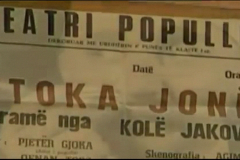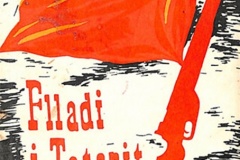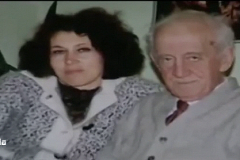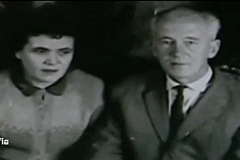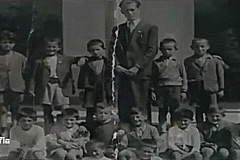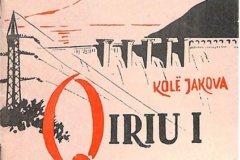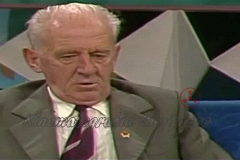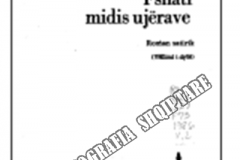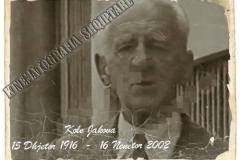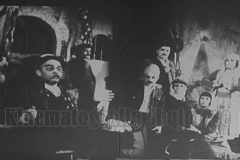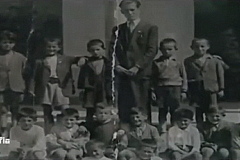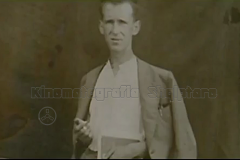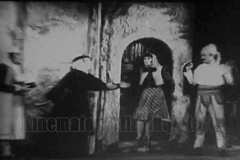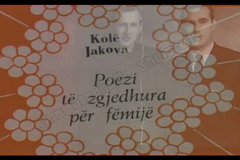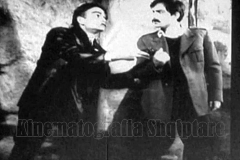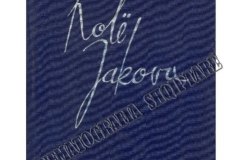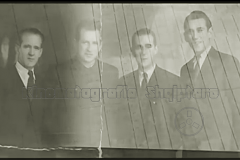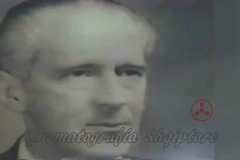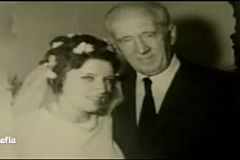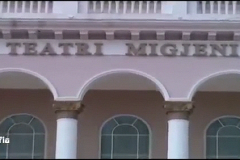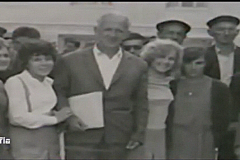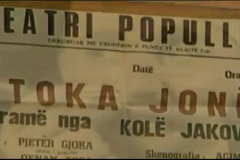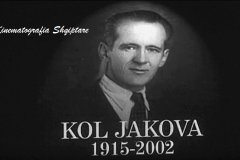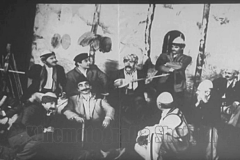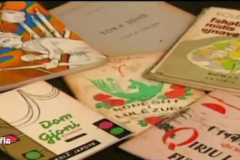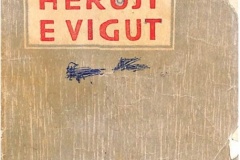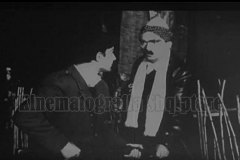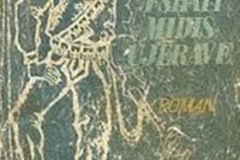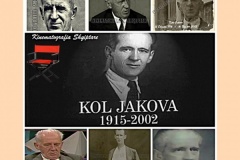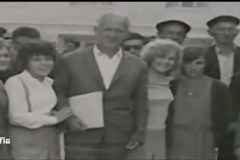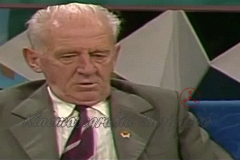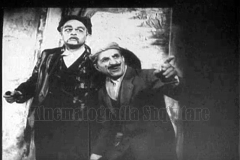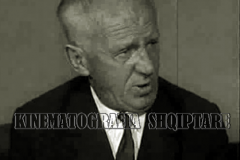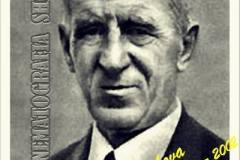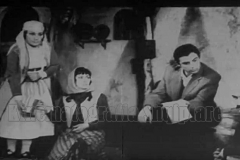Kole Jakova (1915-2002)
Prominent playwright, poet, novelist and musician.
He was the first director of the “Teatri Popullor” and the Philharmonic (1945-1946). Jakova is the man who laid the foundations of modern drama in our country.
Jakova was born on November 22, 1915, in the city of Shkodra. Kole Jakova is probably the best Albanian playwright of all time, even in many ways unattainable by other playwrights. He is one of the great Albanians who lived in three different eras; grew up in the streets of Shkodra during the King Zog regime, grew into a man in the war against fascism and spent his whole life serving the Motherland in noble duties as a teacher, partisan, head of an institution, writer a profession he practiced until his last breath .
 The Jakova family came from Gjakova and as a memory of their origin they kept it as a surname, while their previous surname, Kurti, is still kept by their cousins.
The Jakova family came from Gjakova and as a memory of their origin they kept it as a surname, while their previous surname, Kurti, is still kept by their cousins.
Kola’s father, Mark Jakova, was a watchmaker and goldsmith, while her mother, Lucia, was a housewife. The family situation becomes difficult, when the father remains unemployed and is forced to go and work far from the city. The family lived through many misfortunes; five sons died and then four more who were born after them lived, becoming each one better than the other, all personalities in their field, who will soon stand out for their social commitment, as active citizens and cultured. An important role in their formation was played by mother Lucia, an intelligent, authoritative and family woman.  There are four brothers: Tuk, Kolë, Frano and Filip Jakova, different in inclination, characters, interests, but all four firmly united around the family and national ideal.
There are four brothers: Tuk, Kolë, Frano and Filip Jakova, different in inclination, characters, interests, but all four firmly united around the family and national ideal.
Since childhood, Kola read a lot; the motto of his life was the books that would accompany him until the last days of his life. Every afternoon, with books under his arm, he went to the end of the yard, under a large holly tree, where he first finished his schoolwork and then began to read and read endlessly the books that attracted him.
He also loved music, which he began to devote himself to from a very young age. He studied solfege himself and started playing the clarinet and mandolin. Jakova was so attracted to this part of the art that at the age of 16, he led the city band of 40 and was entrusted with arranging the music for all the instruments.
Kolë Jakova completed all the education provided by the northern city up to the Franciscan School and the Normal near the Gymnasium of Shkodra. In the cultured environment of Shkodra, the ideas of the time circulated, which also influenced his life. Everyone saw the change as necessary; the only problem was how it would be implemented. Educating the population was the best service that could be done to the country, because knowledge and culture were the main weapons in the difficult struggle against the centuries-old backwardness and historical delay of the Albanians.
One day, at the beginning of December 1934, Kola, a young man, had traveled from the city of Lezha to Vau Deja with an envelope in his hand, after he had been appointed the first teacher in that area. The fascist occupation of the country confused the situation that was already confused. The attitude towards the invader was a moral test for the different social strata, for the relations that the citizens of this country had established with freedom and the Motherland.
The Jakova family was among the first in Shkodra to jump into the illegal anti-fascist activity and then into the armed struggle for liberation. Tuk Jakova, one of the main leaders of the Albanian resistance, was considered a dangerous person and was persecuted, but his brothers were persecuted along with him.
Kola was imprisoned in Shkodër and deported in Tepelena. After his release from prison, he joined the partisan forces. The Jakov’s who gave so much to the National Liberation War were people of the people and behaved the same, both in illegality, in war and when they climbed the ladder of power. They did not change their companions and friends and did not turn their backs on them, despite the fact that in life they experienced disappointment from some of them.
During the war, Kola dedicated himself to partisan songs, while after the liberation he showed a multiple commitment as a creator in several genres, a leader in the culture sector and a weighty intellectual. Educated with the great patriotic spirit of the great Shkodra intellectuals, his teachers, he worked tirelessly to raise, develop and modernize our national literature and art.
Jakova worked in the Ministry of Culture, then became the director of the “Teatri Popullor”, leader of the League of Writers and Artists with the role of head of the Dramaturgy Sector and, from 1964 until his retirement, a freelance writer.
 He has been involved in literary creativity since 1935, when he published his first poem in the magazine “Cirko” in Shkodër. It can be said that his creativity extends to several literary genres. He wrote novels, poems, stories and became prominent in the cultivation of drama, becoming the most popular playwright after World War II.
He has been involved in literary creativity since 1935, when he published his first poem in the magazine “Cirko” in Shkodër. It can be said that his creativity extends to several literary genres. He wrote novels, poems, stories and became prominent in the cultivation of drama, becoming the most popular playwright after World War II.
His dramas have dealt with sharp political and social themes and conflicts, accompanied by strong economic highlights that are sent to family relationships, where he feels the most overcoming the traditional patriarchal stage of life in the mountains towards a new and more emancipated moral and psychological relationship.
In the early years of his youth, he wrote several stage plays in the comedy genre, which remain manuscripts without being published. The main field where Kolë Jakova has made a special contribution is dramaturgy, the most difficult field or genre of literature. Jakova is the classic dramatist of the post-war generation.
In his first works, he was successful, expressing the construction structure of the drama of the classical typology. The first work of Kole Jakove, after the liberation, was the comedy “Dom Gjoni (1948) put on the stage of the “Teatri Popullor”, which proved the author’s talent especially in finding a functional artistic structure, organized with a prologue and three acts.
Later he wrote another comedy “Motori” but without success. During the war, he wrote the poems “Song of the Three Heroes of Shkodra” and “Partisan Eagles”.
After liberation, Jakova wrote for children and adults. Among his works are “Halili and Hajria”, published in 1950, “The Heroes of Vigu”, published in 1953, the drama “Our Land”, published in 1955, “In Front of the Crossed Bars” from 1973, as well as the books “Albanian poetry” and “Tower by the lake”, “The Crown of Nurie”.
 A successful drama was also “Halili and Hajria” (1950), the inspiration of which is taken from a well-known popular song from Shkodra “Fryni era eu cil taraba”, (in Shkodran dialect) but which has to do with a historical fact of the uprising of the Albanians against Sulejman, this wild and punishing “Pasha” of the northern areas and the resistance of Halil Garria, the character of this drama.
A successful drama was also “Halili and Hajria” (1950), the inspiration of which is taken from a well-known popular song from Shkodra “Fryni era eu cil taraba”, (in Shkodran dialect) but which has to do with a historical fact of the uprising of the Albanians against Sulejman, this wild and punishing “Pasha” of the northern areas and the resistance of Halil Garria, the character of this drama.
In 1954, he continued with the drama “Our Land”, one of the most culminating works of his creativity. This drama has turned into an anthological work in the tradition of Albanian dramaturgy of socialist realism.
In 1965, he presented to the public “Perkolgjinajt”, an interesting topic related to the emancipation of the peasant masses. The disintegration of the patriarchal family, the breaking of the chains that were held tightly by a backward consciousness, the creation of new relationships due to the influence of the country’s industrialization and social progress, bring to this drama conflicts and strong dramatic motives.
In the wake of this problem, but with the subject of the collectivization of deep mountain areas in the middle of in the 1960s, another drama “Lugajanet” (which was published in 1977) was produced. 1972 he writes “Gjetani”, a drama which deals with the problem of affirming new norms in the creation of a family with love against the backward customs of engagements in the cradle.
1974 “Pomegranate flowers”; 1975 “Together with the Dawn”, 1978 “The Great Flood”, dramas that continue to consolidate his individuality and style as an author who likes strong events and conflicts.
All the works written by the great master Kole Jakova, gave a significant help to the development of dramaturgy, making him the greatest dramatist of all time. Kolë Jakova remains a realist in dealing with various topics, as he penetrated deeply into human reality. He was a true national dramatist who raised the Albanian character in art.
Kole Jakova passed away on November 16, 2002
 CREATIVITY:
CREATIVITY:
How the village is created (1945); Dom John (1948); Engine; Behind the walls; Halili and Hajria (1950); Heroes of Vigu (1953); Our Land (Drama 1954); October Breeze (1956); Wild Goat (1958); The Crown of Nuria (1958); The Flower Garden (1958); First Rays (1959); “Briartat” (1963); The Last Candle (1963); King of the Divas (1964); The Echo of the forest (1967); “Perkolginajt” (Drama 1965); Glory to the Soldier (1966); The Krutane`s Guard (1967); Concrete help (1967; Concrete help (1971); Village between the waters (Satiric novel 1972); In front of the crossed bars (1973); Pomegranate flowers (Drama 1974); Together with the dawn (Drama 1975); Albanian poetry; Tower by the lake (Novel) ; The Great Flood (1978)
_________________________
Albanian Cinematography in activity since March 2013;
Reference in the construction of this article: Gazeta ” year 2002 / “Shqiptarja .com” (N. Loka) 2015; “Encyclopedia, Theater and Albanian Cinematography” – Toena 2009 / Papagjoni. J / p. 195-196-197. It was revised in the following years.
Follow us: Blog: https://albaniancinematography.blogspot.com/ Vimeo: Albanian Cinematography (vimeo.com) Facebook: https://www.facebook.com/ksh.faqjazyrtare Dailymotion: https://www.dailymotion.com/kinetografiashqiptareartisporti YouTube: https://www.youtube.com/channel/UCDRYQ5xCyGkfELm3mX8Rhtw
Discover more from Albanian Cinematography - Sport
Subscribe to get the latest posts sent to your email.

